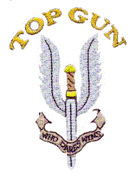There will not be Top Gun training in calendar year 2012. Please check back for updates for training in 2013.
Background

In 1995, the New Jersey State Police realized the need for a training program seeking to prepare investigators and prosecutors for the rigors of narcotics investigations. Given the intensity and unique problems involved with these investigations, a curriculum was developed that trained both professions side-by-side. This course is now known as Top Gun.
Colonel Steve Gingrich of the North East Counter Drug Training Center (NCTC) learned of this training and believed that a number of states could benefit from this type of instruction. NCTC is one of four National Guard training centers dedicated to educating law enforcement agencies with relevant training.
NCTC instructors attended a New Jersey Top Gun course and subsequently developed a similar Top Gun curriculum for other states. The program utilizes each state's laws and court rulings which affect drug investigations and prosecutions. Currently, Pennsylvania, Connecticut, New Jersey, Virginia, Maryland and Kansas participate yearly in Top Gun. In 2011, Kansas hosted its 9th training.
Top Gun focuses on the various stages of a narcotics investigation and prosecution. Training involves classroom presentations and practical exercises and covers the course of an investigation, including the initial information being received, resulting search warrants and presentation of a prima fascia case. An enhanced learning environment is created by utilizing a "team" concept combining prosecutors and investigators. This helps provide insight into each others' areas of responsibility.
For NCTC to sponsor Top Gun training for a specific state, a state-level sponsor is required. The Kansas Bureau of Investigation (KBI) has agreed to be the sponsoring agency for Kansas. Partnering with the KBI to bring Top Gun to Kansas are the Kansas National Guard (KNG), Kansas Narcotics Officers Association (KNOA), the Kansas County and District Attorney's Association and the Kansas Highway Patrol.
In preparing to bring the training to Kansas, NCTC hosted eight Kansas investigators and prosecutors at a Pennsylvania Top Gun school. This first training class consisted of Special Agent-in-Charge (SAC) Jeffery Brandau, KBI; SAC Kelly Ralston, KBI; Captain Brad Homman, Dickinson County Sheriff's Office; Assistant Reno County Attorney Tom Stanton; Lieutenant Mark Bacon, KHP; Patrolman Bill Cox, Salina Police Department; Don Scheibler, Hays Police Department; and Assistant Shawnee County District Attorney Matt Patterson. Each agency represented is committed to making Top Gun a success in Kansas.
In addition, NCTC has hosted seven additional Kansas professionals at a Top Gun school in Maryland. The following professionals attended this training: Assistant Sedgwick County District Attorney Mike Jennings; Investigator Richard Hundertfund, Topeka Police Department; Investigator Douglas Garman, Topeka Police Department; Sergeant Kelly Schneider, Russell County Sheriff's Office; Senior Special Agent Kevin Campbell, KBI; Investigator Dan East, Wichita Police Department; Investigator Pat Greeno, Kansas City, Kansas, Police Department; and Marc Toomey, KNG Counterdrug Unit.
Kansas Top Gun Training Curriculum
Top Gun is designed for narcotics investigators and prosecutors with 0-5 years of experience. It is also aimed at patrol officers who aspire to becoming future narcotics investigators.
Officers can expect to learn: specific techniques and ethical handling of criminal informants, how decisions made during an investigation can "make or break" a case; hands-on experience in executing search warrants; strategies for charging defendants; vehicle and foot surveillance of suspects; enhanced interview and interrogation skills; dynamic entry and raid planning; updated information on search and seizure law; prosecutors' concerns; and increased knowledge of asset forfeiture and money laundering.
Prosecutors can expect to learn: specific techniques and ethical handling of criminal informants; why police use various investigative techniques; effective strategies for charging defendants; updated search and seizure information; how to examine search warrants; how to plan and execute a search warrant; vehicle and foot surveillance of suspects, tactical firearms training with officers as partners in order to learn stresses attached to tactical use of firearms; and investigators' concerns.
There is no cost to attend Top Gun. The Kansas Bureau of Investigation pays all expenses incurred by the trainees, including room and board and instructors' fees. Participating agencies are responsible for salaries and transportation to the training site. Kansas has already held seven Top Gun schools and trained over 550 students, in addition to investigators and prosecutors from five different states.







